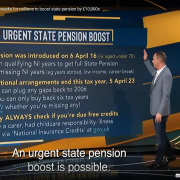Boost State Pension by Plugging Gaps in National Insurance
IMPORTANT: the video mentions the original deadline in April 2023. This has now been extended to 5th April 2025.
Do you have gaps in your National Insurance record? If so, it could mean that you could get a lower State Pension when you reach state retirement age, particularly if you are aged between approximately 45 and 70 at the moment. Generally speaking, you need 10 years of contributions for a basic state pension and around 30 to 35 years for a full state pension. It does vary by circumstance though and, even with gaps, some people might have enough qualifying years for the full state pension already.
Urgently Check Whether You Have National Insurance Gaps
Our advice is to urgently check whether you do have any gaps in your National Insurance record. If so, in many cases it would be wise to make some one-off payments to plug any gaps for the years 2006 to 2016. However, there is limited time to do so despite the deadline for this opportunity having been extended from early April to the end of July 2023 [UPDATE: This has now been extended again to 5th April 2025]. Thereafter, the chance to fix all 11 years from 2006 to 2016 will be gone forever. Read more

